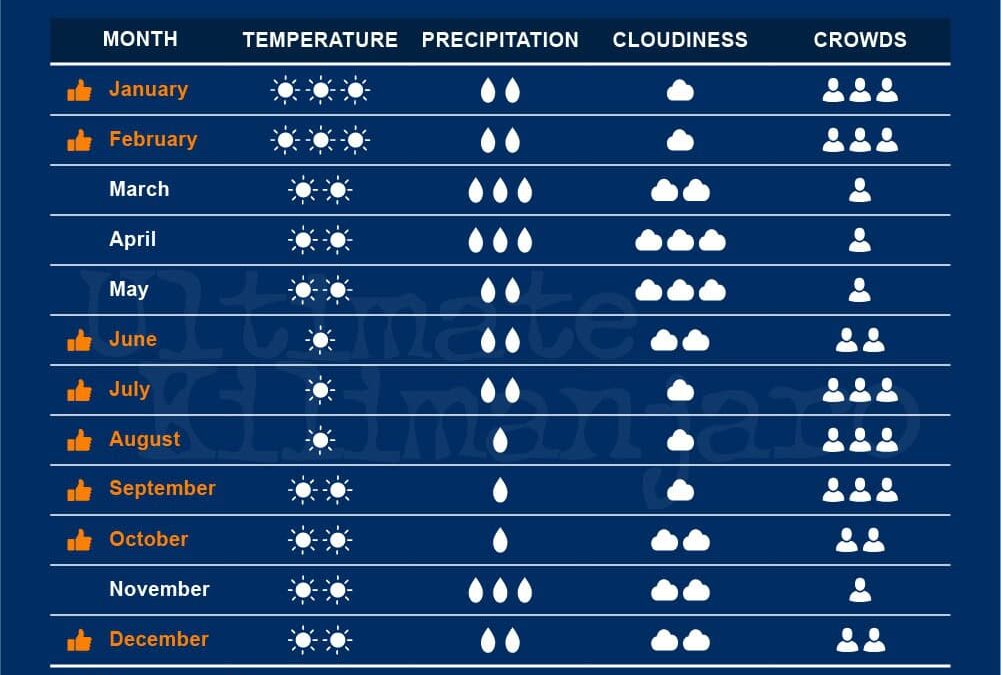
Benefits of Planning Your Kilimanjaro Climb 6-9 Months in Advance
Planning your Kilimanjaro climb 6-9 months ahead allows you to choose the best season. Climbing Kilimanjaro during the dry months means fewer chances of rain. This makes the climb safer and more enjoyable. You can check out this post for detailed season information.
With ample time, you can build up your physical fitness gradually. Training for Kilimanjaro is tough, but starting early makes a big difference. You’ll have more energy and stamina for the demanding trek. This preparation will give you a better chance to reach the summit.
This timeline helps with all necessary vaccinations and visa arrangements. You can avoid last-minute hassles by getting your health and travel documents sorted early. According to the article, proper planning prevents rushing through important steps. This leads to a smoother, stress-free journey.
Booking in advance often translates to cost savings and better accommodation choices. Alpha Grand Tours offers discounts for early bookings. You can secure prime spots and exclusive perks. Planning ahead ensures you get the best value for your adventure.
Optimal Season Selection
Choosing the optimal season for your Kilimanjaro climb is crucial. The best months are January to March and June to October. These months have the most favorable weather for trekking. According to this post, you can expect clearer skies and less rain during these periods.
For many climbers, avoiding rainy seasons is essential. Rain can make the trails slippery and more dangerous. Planning your climb during the dry season provides better conditions. You’ll have a safer and more enjoyable experience overall.
Additionally, the dry months usually have more stable temperatures. This helps in reducing the risks associated with fluctuating weather. Trekkers can prepare better for a consistent climate. Such stability increases the chances of a successful climb.
Here’s a table showing the ideal months and expected conditions:
| Month | Weather Condition |
|---|---|
| January – March | Dry and clear skies |
| June – October | Dry with mild temperatures |
Better Preparation Time for Physical Fitness
Having 6-9 months to prepare for Kilimanjaro allows for better physical training. The climb is challenging and demands good stamina. Gradual training helps your body adapt to the rigors. Regular exercises contribute to stronger muscles and endurance. This preparation boosts your confidence for the trek.
Here’s a list of activities that are beneficial during the preparation phase:
- Cardio exercises like running and cycling
- Strength training for legs and core
- Hiking on local trails
- Flexibility exercises such as yoga
A well-rounded training plan includes various workouts. Combining cardio, strength, and flexibility exercises enhances overall fitness. It’s important to start slow and gradually increase intensity. This prevents injuries and ensures steady progress.
Using the time wisely also means acclimatizing to altitude changes. Hiking at higher elevations before the trip prepares your body for Kilimanjaro’s height. According to the article, consistent practice at altitude can significantly reduce the risk of altitude sickness. Proper planning ensures you are fit and ready for the adventure.
Ample Time for Vaccinations and Visa Arrangements
Planning 6-9 months in advance gives you plenty of time to handle vaccinations. There are specific vaccinations recommended for travelers to Tanzania. These include shots for hepatitis A, typhoid, and yellow fever. With ample time, you can schedule these safely. It ensures you don’t miss any important health precautions.
The timing also allows for careful visa arrangements. Applying for a visa can take a while and requires proper documentation. Starting early avoids last-minute stress. According to this article, properly handling visa requirements smooths your entry into Tanzania. A well-planned visa process is crucial for a hassle-free journey.
Here is a table of some necessary vaccinations and their recommended timelines:
| Vaccination | Recommended Timing Before Travel |
|---|---|
| Hepatitis A | 6 months |
| Typhoid | 1 month |
| Yellow Fever | 10 days |
Additionally, having extra time helps ensure all paperwork is in order. Double-checking your documents avoids any mistakes. This includes confirming your travel insurance and other essential details. A thorough review can prevent issues at border crossings.
All this planning means you’re less likely to face delays. Missing vaccinations or incomplete visas can derail your trip. Early preparation gets everything sorted on time. It makes your Kilimanjaro climb smoother and worry-free.
Advantageous Pricing and Booking Options with Alpha Grand Tours
Booking your Kilimanjaro climb with Alpha Grand Tours 6-9 months ahead offers great pricing benefits. Early bird discounts are often available, saving you money. These discounts can make the difference in your budget. Planning ahead, you’ll secure funding for other trip essentials. It’s a smart way to maximize your adventure experience.
Here is a list of early booking benefits:
- Lower prices for packages
- More options for preferred dates
- Better accommodations and gear availability
- Exclusive deals on extra activities
Early booking also means better choices in accommodation. Alpha Grand Tours guarantees high-quality lodging. Those who book early have the first pick of the best rooms. This ensures comfortable stays during your trek. Comfortable lodging can greatly improve your overall experience.
Having more time allows you to plan extra activities. Alpha Grand Tours offers package deals that include local exploration. You can enjoy safaris, cultural tours, and more. Coupling your climb with these activities enriches your trip. Varied activities provide a fuller Tanzanian experience.
Furthermore, booking early secures spots with experienced guides. Alpha Grand Tours employs expert guides for all climbs. Experienced guides enhance your safety and climb success. Early booking ensures you get the best support. This contributes to achieving your goal of reaching the summit.
Don’t miss out on these benefits. Plan your Kilimanjaro adventure with Alpha Grand Tours. Early preparation leads to a more fulfilling and safer experience. You’ll thank yourself for making these smart choices. Happy climbing!
Consequences of Last-Minute Bookings for Kilimanjaro
Scheduling your Kilimanjaro climb at the last minute comes with risks. Firstly, it’s harder to find suitable accommodations and guides. Popular dates might already be booked. This reduces your options significantly. Losing quality lodging can affect your comfort and experience.
Training for the climb requires preparation time. Last-minute bookings don’t give you enough time for physical fitness. Your body needs months of training to handle the trek. Skipping this preparation increases injury risks. It also decreases your chances of reaching the summit.
Last-minute arrangements can also lead to missed vaccinations. Vaccines prevent potential health risks during travel. Without proper vaccinations, you might be exposed to serious diseases. Here is a post that highlights the importance of timely vaccinations.
Visa processes can be complicated and time-consuming. Planning at the last minute might result in visa delays. Insufficient paperwork can even cause rejections. These issues can jeopardize your entire trip. No one wants a climb canceled due to overlooked visa requirements.
Here’s a table showing potential issues with last-minute bookings:
| Issue | Consequence |
|---|---|
| Unavailable Accommodations | Lower comfort and increased stress |
| Insufficient Training | Higher injury risk and reduced summit success |
| Missed Vaccinations | Exposure to serious diseases |
| Visa Problems | Trip cancellation or delays |
Lastly, last-minute booking can often be more expensive. Flights and tours closer to the date usually cost more. You miss out on early bird discounts and special deals. Higher costs can strain your budget, making the trip less affordable. Booking in advance saves money and ensures a smoother adventure.

Frequently Asked Questions
Here you will find answers to common questions about planning your Kilimanjaro climb in advance. This section provides insights on the best practices, preparations, and tips for a successful trip.
1. What are the best months to climb Kilimanjaro?
The best months to climb Kilimanjaro are January to March and June to October. These months feature clearer skies, less rain, and more stable weather conditions, making the trek safer and more enjoyable.
Additionally, these periods offer milder temperatures and better chances of summit success. Booking during these months ensures you experience the best possible conditions for your adventure.
2. How should I train for climbing Kilimanjaro?
Training for Kilimanjaro should include a mix of cardio, strength, and flexibility exercises. Running, cycling, or hiking are great for building stamina, while strength training focuses on legs and core muscles.
It’s also important to practice hiking on local trails and to gradually increase the difficulty. Consistent training over several months will prepare your body and boost your confidence for the climb.
3. Do I need vaccinations for traveling to Kilimanjaro?
Yes, vaccinations are recommended for travelers to Kilimanjaro. Commonly recommended vaccinations include hepatitis A, typhoid, and yellow fever. It’s essential to consult with your healthcare provider to get the necessary shots.
Planning your vaccinations well in advance ensures you stay healthy during your trip. It also helps you avoid any last-minute health complications that could impact your travel plans.
4. Why is early booking for Kilimanjaro recommended?
Early booking for Kilimanjaro is recommended to secure the best accommodations, guides, and pricing. Tours can fill up quickly during peak seasons, so booking in advance ensures you get your preferred dates and options.
Additionally, many tour companies offer early bird discounts, saving you money and providing more flexibility in your budget. Planning ahead also reduces stress and allows you to focus on preparation.
5. What are the potential risks of last-minute bookings?
Last-minute bookings can lead to limited accommodation options, higher costs, and difficulty securing experienced guides. You may also struggle with insufficient training time and missed vaccinations.
These factors increase the risk of injury, health issues, and overall trip complications. Planning your climb several months in advance helps mitigate these risks and ensures a smoother and more successful journey.


